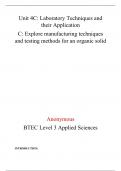Essay
Unit 4C: Explore manufacturing techniques and testing methods for an organic solid
- Course
- Institution
Aspirin is a generic term for acetylsalicylic acid. This substance was first introduced in the late 1890s, that has become a ‘’non-steroidal anti-inflammatory drug’’, non-opioid analgesic and antiplatelet drug which is widely used for medicinal purposes. Aspirin will not react against the a...
[Show more]



